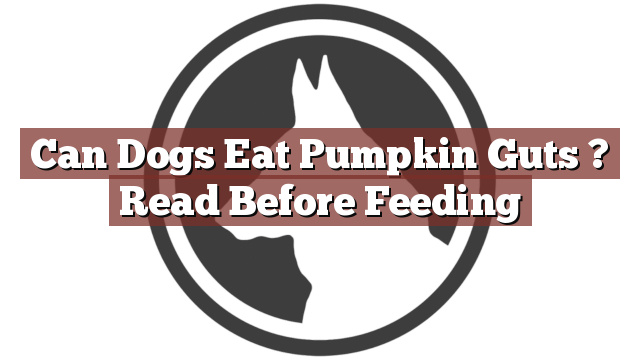Understanding Your Dog’s Dietary Needs
As a responsible pet owner, it is important to understand the dietary needs of your dog. While dogs are primarily carnivores, they can also benefit from certain fruits and vegetables in their diet. However, it is crucial to ensure that the foods you offer them are safe and suitable for their digestive system. Before introducing any new food into your dog’s diet, it is essential to do your research and consult with your veterinarian.
Can Dogs Eat Pumpkin Guts? Read Before Feeding
Can dogs eat pumpkin guts? This is a common question that arises during the fall season when pumpkins are plentiful and carving them is a popular activity. The answer is yes, dogs can eat pumpkin guts in moderation. Pumpkin guts, which refer to the slimy and stringy contents found inside a pumpkin when it is cut open, can be beneficial for dogs when served in the right way.
Pumpkin is rich in fiber, vitamin A, and other essential nutrients that can promote digestive health in dogs. It can help regulate their bowel movements, which can be particularly helpful for dogs experiencing constipation or diarrhea. Additionally, pumpkin can aid in weight management as it is low in calories. However, it is important to note that dogs should only consume plain, cooked pumpkin without any added sugars, spices, or oils.
Pros and Cons of Feeding Pumpkin Guts to Dogs
Feeding pumpkin guts to your dog can have both pros and cons. On the positive side, pumpkin is a great source of fiber, which can improve digestion and relieve certain gastrointestinal issues. It can also provide your dog with essential vitamins and minerals that contribute to their overall health. Moreover, since pumpkin is low in calories, it can be a healthy addition to your dog’s diet if they are overweight or prone to weight gain.
However, there are a few things to consider before feeding pumpkin guts to your dog. First, it is important to remove the seeds and any parts of the pumpkin that may be difficult for your dog to digest. These can pose a choking hazard or cause an upset stomach. Additionally, while pumpkin can be beneficial in small amounts, excessive consumption can lead to digestive upset, such as diarrhea. Therefore, it is crucial to introduce pumpkin gradually and in moderation to avoid any adverse effects.
In Conclusion: Proceed with Caution and Consult Your Vet
In conclusion, dogs can eat pumpkin guts in moderation, as long as they are plain, cooked, and free from any additional ingredients. Pumpkin can provide several health benefits for dogs, such as improved digestion and weight management. However, it is important to proceed with caution and consult your veterinarian before introducing any new food into your dog’s diet, including pumpkin. Your vet can provide personalized guidance based on your dog’s specific needs and ensure that their dietary requirements are met adequately. Remember, the key to a healthy and happy dog is a balanced and appropriate diet.
Thank you for taking the time to read through our exploration of [page_title]. As every dog lover knows, our furry friends have unique dietary needs and responses, often varying from one canine to another. This is why it's paramount to approach any changes in their diet with caution and knowledge.
Before introducing any new treats or making alterations to your dog's diet based on our insights, it's crucial to consult with a veterinarian about [page_title]. Their expertise ensures that the choices you make are well-suited to your particular pet's health and well-being.
Even seemingly harmless foods can sometimes lead to allergic reactions or digestive issues, which is why monitoring your dog after introducing any new food item is essential.
The content provided here on [page_title] is crafted with care, thorough research, and a genuine love for dogs. Nevertheless, it serves as a general guideline and should not be considered a substitute for professional veterinary advice.
Always prioritize the expert insights of your veterinarian, and remember that the health and happiness of your furry companion come first.
May your journey with your pet continue to be filled with joy, love, and safe culinary adventures. Happy reading, and even happier snacking for your canine friend!

